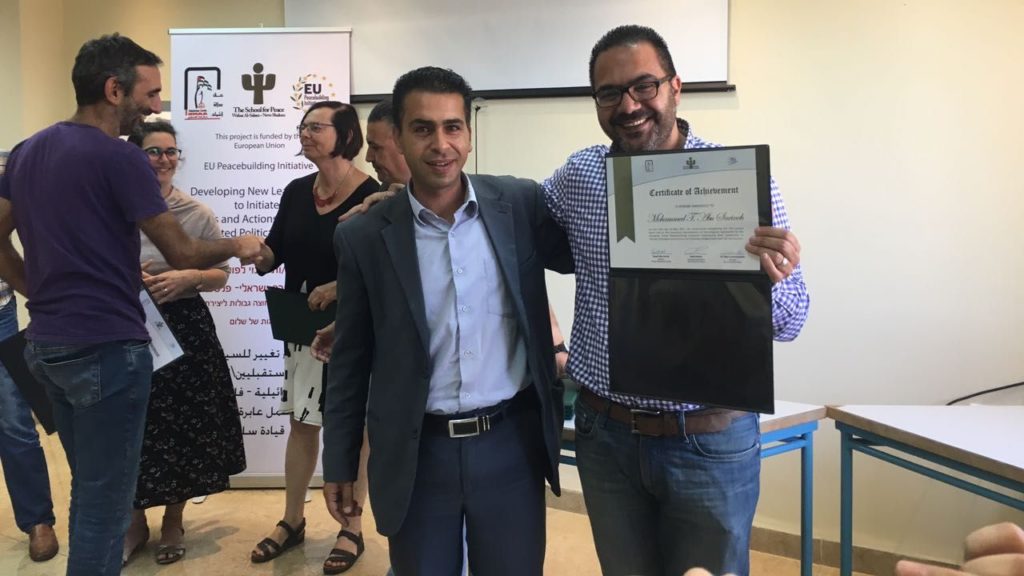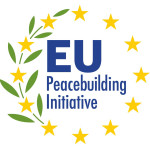“We need this kind of dialogue”- Participant in our Politicians course writes about his experience
On May 12 in Talitha Kumi in Beit Jala, the School for Peace and Inmaa Palestinian Center held the final workshop in a course that last for nearly one year and a half. The course which is funded by the EU Peacebuilding Initiative, was only the first of three courses aimed at Israeli, Palestinian-Israeli, and Palestinian from the West Bank, Up-and-Coming Politicians.
This is what Avi Dabush, participant in that course, had to say about his experience:
Today I finished a program which lasted for over a year and targeted Israeli and Palestinian politicians. The program was initiated by the School for Peace in Neve Shalom – Wahat Al-Salam. We ended the program with two days in Beit Jala which allowed us to meet in relative comfort.
This program was the most meaningful opportunity I had for serious dialogue with Israeli, Jewish and Palestinian partners, especially Palestinians from the West Bank, throughout which we tried to understand how far the identities, narratives, fears, dreams, and abilities can go towards a solution for the conflict.
We were lucky to have an excellent and diverse group on all sides. So what did I learn in short?
- We need this kind of dialogue- there is alternative to the deep and serious discussions, hundreds of hours, with our partners to end this conflict.
- We have a partner, big time- despite the difficulty, the differences, the fears, and the grudges. There is a big Palestinian group and its leader, in all honesty, wants dialogue and peace.
- The role of the Palestinian Israelis (48 Arabs if you wish) is crucial, and they have their own distinctive role. Not as attachés, but as “mediators”. Solving the conflict allows and dictates an arrangement for the relations between the Jewish Majority- Palestinian Minority inside of Israel.
- The two-state solution needs readjustment- the Two States One Homeland initiative is an excellent direction for that. It’s complex, but with time is getting a central place in the shared discourse.
- Moving forward with a solution requires internal group dialogue. Israeli in general, Jewish-Israeli, Israeli-Palestinian, Palestinian Authority. The Oslo process tragically lacked all these elements.
- The gaps cannot be measured in percentages- whoever thinks that we can start with Annapolis, for example, which was the closest point between the delegations, think again. Reality is not frozen in place. The solution will require deep questions and deeper understanding on the emotional, historical level- both knowledge-wise and practically.
- Reality on the ground is fastly changing- with the settlements on the one hand and the municipal management (in East Jerusalem) and military management (in Area C and others), are the daily struggle of Palestinians. We cannot ignore that.
- Always optimistic, even more so now- because there is a difference between a far off wish and between actually touching reality. In recent years I’ve also been in touch with the Palestinian group from the Two States One Homeland initiative. That’s where my optimism comes from.
- Our greatest enemies- lack of faith, fighting a solution that takes into account the national aspirations of the Palestinians\Israelis, and especially (in Israel) the apathy and the lack of knowledge (by most of us) concerning the conflict. I see it clearly in the courses I do on the conflict for 18-year-olds. This is a great obstacle. It’s important work for all of us who want a sustainable solution, for all our sakes.
The second course for Up-and-Coming Politicians is already in its third month. For more about the course- [Link]
[in the picture: Muhammad Abu Sneineh (lawyer) receiving his certificate from Inmaa Director, Shadi Abu Arrah, and Avi Dabush receiving his certificate from SFP Director, Nava Sonnenschein.]
Project funded by the European Union



